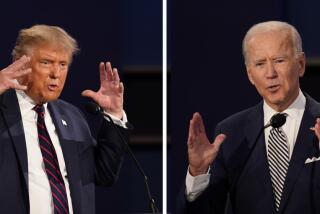Can you match.com your favorite candidate?
What happens to the soul after death? Is it judged immediately, or does it wait until one big Last Judgment? Does its spiritual development continue? Is it endlessly reborn until it attains enlightenment? Is it extinguished forever? Did it exist in the first place? Your answers to these and other questions will reveal your faith -- that is, if you accept that an online questionnaire can point you to the right religion.
That’s the notion behind Belief-O-Matic, which I first encountered several years ago while checking out Beliefnet.com. I took the quiz and discovered I was supposed to be a Unitarian. My reaction was not to find a Unitarian church and start attending services. It was to start over and try different answers.
See, I didn’t want to be a Unitarian. Why not? I mean, aside from the fact that none of my rabbis would have approved? I don’t know. I just didn’t see myself as a member of that church.
Later, I showed the quiz to a handful of acquaintances who described themselves as “spiritual but not religious.” One insisted that he was a Buddhist, but on answering the questions was stunned to discover that he too was a Unitarian, which apparently just wasn’t cool enough for him. “Dude,” he said, “I didn’t know we weren’t into the soul. Here, let me try that again.” He and the others kept filling in different answers until they came up with the hippest religions available. One kept trying to be a Zoroastrian but just couldn’t nail it.
I thought about that the other day when one of my Los Angeles Times colleagues found and circulated Minnesota Public Radio‘s Select-a-Candidate poll. Same format, although perhaps with fewer eternal consequences. Answer some questions about your positions on Iraq, tax cuts, immigration, ethanol production and the like and learn who your candidate in the 2008 presidential election should be.
A surprising number of my co-workers discovered they were, or ought to be, supporters of Christopher Dodd. But there was also a Ron Paul guy, a Mitt Romney, a few Dennis Kuciniches.
Wait. Christopher Dodd? Who’s he? Let’s look him up.
It’s possible the exercise will create the nucleus of a Dodd movement that will overtake John Edwards, surge past Barack Obama and ultimately upend Hillary Clinton’s pack-leading campaign for the Democratic nomination. It’s possible. But I doubt it. I suspect that many people whose answers lead them to Dodd will try again with different responses.
Maybe that’s because Dodd just isn’t an image guy. You’re saying something about yourself when you tell friends at a party or strangers at a Coffee Bean that you’re an Obama voter, or a Giuliani person. People will know who you are, because they know what your candidate looks and sounds like, whether or not they know their stances on the issues. Mention of the candidate’s name immediately brings to mind not just a mental picture but a feeling about who that person is and what he or she stands for. Where is Giuliani on the environment? I don’t remember, a supporter might say, but he’s a tough SOB and I like that.
If you tell people at the bus stop you’re a Dodd enthusiast, well, you may sound like you have special knowledge, but you may not really be signaling what makes you tick.
The idea that voters select candidates for reasons other than their stances on issues is nothing new. You may agree on the positions with, say, Tom Tancredo or Kucinich but still not want to see either one with their finger on the nuclear button.
In a recent cover story in Reason magazine, George Mason University economics professor Bryan Caplan delved into American voters’ cluelessness about economic principles and how that leads them to cast votes against their own interests. He makes some interesting points, but in the end I suspect that even people forced into six weeks of economic basic training boot camp would end up voting based on intangibles like how the candidate makes one feel about oneself.
The other President Bush -- George H.W. -- may have hit on something when he brushed past issues in his acceptance speech at the Republican National Convention in 1988, telling television viewers what they already knew, even if they didn’t want to admit it to themselves. What it all comes down to, the first Bush said, is “the man at the desk.” Do you like him? Trust him? Want to hang out with him? How do you feel about having to listen to his voice on the news for the next four years?
Bush’s statement is slightly outdated now because the leading Democrat is the wife of the man who defeated him for reelection. But OK. It’s the man or woman at the desk.
Political consultants are way past questions about trust and respect. What they really want to know is: Whose story do you like the best? Do you respond better to a Joe Biden, who seems to know everything and has been around forever? Or do you prefer a guy like Fred Thompson because he has stature in another field but is a fresh face in politics? Maybe you like Hillary Clinton, not merely because you like her strength and where she is on the issues but also because you’d see in her election simultaneous vindication against the vast right-wing conspiracy and cheating husbands. Or perhaps you like that a Mormon Republican such as Romney could emerge from Massachusetts, homeland of the Catholic Kennedy clan.
Certainly someone could come up with an algorithm to take all these factors into account. If Amazon.com can tell you whose CD you’d like, or if Match.com can tell you who you’d like to date, someone could tell you what candidate to vote for.
But of course, you’d already know which candidate you like, even if you don’t acknowledge your reasons, even to yourself.
The disconnect between which candidates voters like and where they are on the issues looms even larger in local elections, where issues are even more amorphous. How do you know which judicial candidate to pick, for example? The fair one? The tough one? The candidates know that, and virtually all of them claim to be “tough but fair.”
Voters claim to want more information, and candidates claim to want them to have it. But data sheets that list a candidate’s qualifications and educational background seldom help much. If the mailers sent out by the most successful candidates are a guide, what a voter really wants to know is whether the candidate has a dog, whether kids smile in his or her presence and whether police officers trust him or her enough to chat over the open door of a patrol car.
Of course, issues matter too. What political consultants know, and many voters refuse to acknowledge, is that they matter less than what they would like to believe.
Robert Greene is a member of The Times’ editorial board; click here to read his archive. Send us your thoughts at opinionla@latimes.com.
More to Read
A cure for the common opinion
Get thought-provoking perspectives with our weekly newsletter.
You may occasionally receive promotional content from the Los Angeles Times.







